So, you recently found out you have COPD and you're not sure what to do. You might be feeling scared, lost, overwhelmed, or anxious about what will come next.
First of all, take a deep breath and remind yourself that you will be okay. COPD is a serious disease, but it doesn't mean your life as you know it is over. Many people go on to live many long, happy years after getting diagnosed with COPD.
Even though the news can come as a shock, it's important not to not panic or get too discouraged about your diagnosis. COPD is treatable, even if it's not curable, and the next steps you take can have a major impact on your disease and how quickly your symptoms get worse.
One of the worst things you can do is get stuck in the trap of dwelling on what-ifs and feeling hopeless about things you can't change. Instead, you should do your best to focus on what you can change in order to keep yourself healthy and live the longest, best life possible in spite of your disease.
That's why we created this guide to help you figure out what to do after you've been diagnosed with COPD. In the sections below, we'll walk you through 11 vital steps you can take right away to preserve your health and take charge of your disease.
Learning how to manage COPD is a complicated journey, and it helps to have a roadmap to point you in the right direction. Luckily, there are plenty of resources to help you get started, including the one you're reading now, and you will find links to many more all throughout this guide.

The Next Steps: What to Do After Your COPD Diagnosis
Stop Smoking!
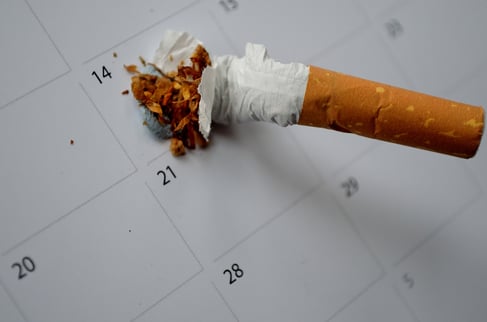
Don't make the common mistake of believing that it's not a big deal to keep smoking just because you already have COPD. The truth is, continuing to smoke after your COPD diagnosis is extremely dangerous; it can shorten your lifespan, make your symptoms more severe, and make your quality of life significantly worse.
One of the major effects of COPD is that it makes your lungs extra vulnerable to inflammation. Anything you breathe that irritates your lungs, including dust, allergens, and smoke, can make your symptoms worse for hours or even days at a time.
Even worse, inflammation can lead to permanent lung damage and accelerated loss of your remaining lung function. It can also make you more likely to have a COPD exacerbation, which is a prolonged episode of worsened respiratory symptoms that requires special treatment—and sometimes even hospitalization—to cure.
But studies show that if you quit smoking, it can reduce your COPD symptoms, make it easier to breathe, and reduce your risk for other health complications. It can even improve the overall function of your heart and lungs, reducing shortness of breath and making it easier to do physical activities.
Most importantly, research suggests that quitting smoking is the most effective thing you can do to slow down the progression of COPD. It can help you live longer, live better, and suffer from less severe symptoms over the course of your disease.
Of course, stopping smoking is almost never an easy thing to do. Many people need help quitting, which is why there are a wide variety of smoking cessation resources available to assist you if you need them.
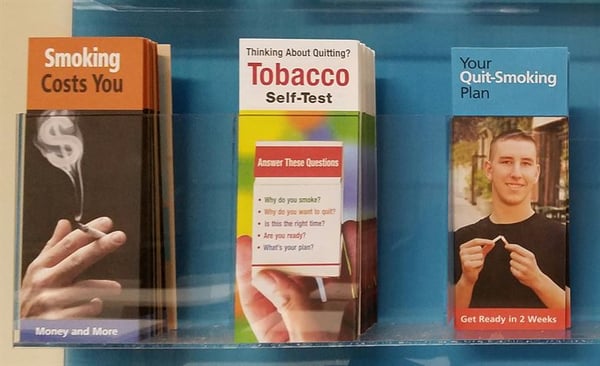
U. S. Air Force photo by Beverly Joyner
Don't be discouraged if you've tried and failed before; most smokers make many quit attempts before it finally sticks. You might be more likely to succeed if you use one or more quit smoking medications, such as nicotine replacement patches or pills.
Other helpful resources include quit smoking counseling (which is generally free with medicare), quit smoking hotlines, and online smoking cessation programs. The first step is deciding that you want to make the firm commitment to quit, and then you can set up a plan including a quit date and a strategy for gathering the support, medication, and any other tools you need to help you succeed.
Learn Anything and Everything You Can About COPD

In order to manage your COPD effectively, you need to understand your disease and what it takes to minimize further damage to your lungs. The more you know, the better you can manage your symptoms, make healthy choices, and maintain your quality of life.
That's why it's important to learn everything you can about COPD and how to live responsibly with the disease. That includes learning how COPD affects your body, how it progresses over time, and the myriad ways you can improve the health of your heart and lungs. COPD oxygen therapy treatment is one of the best ways to reduce symptoms regardless of whether you have mild or severe COPD.
There are many online resources you can use to research COPD and learn practical strategies for managing the disease. We have a variety of helpful guides on our Respiratory Resource Center blog to help you get started, all of which include numerous links to helpful information from doctors, researchers, and other COPD experts.
https://blog.lptmedical.com/
You can start with following guides which cover a variety of vital COPD topics:
- Learn About the 4 Stages of COPD
- 15 Tips for Reducing Your Risk for COPD Exacerbations
- How to Prevent COPD-Related Heart Attacks
- How COPD Affects Your Immune System
- The Importance of Following Your COPD Action Plan
- How to Avoid Common Mistakes New COPD Patients Make
COPD-Proof Your Environment
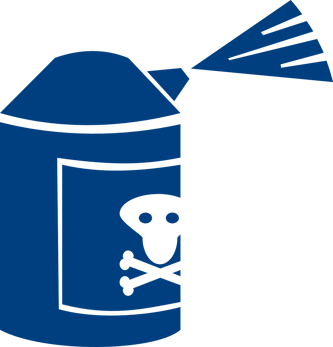
One of the first things you should learn about COPD is that many common chemicals, microbes, and airborne particles can worsen your COPD. That includes common household allergens like pollen, dust, and mold, as well as other respiratory irritants like fragrances and smoke.
In order to minimize your symptoms and keep your COPD under control, it's important to minimize your exposure to these and other respiratory hazards. That means avoiding air pollution both outside and inside, but especially within your own home.
Indoor air quality is important, and one of your immediate priorities should be to create a lung-friendly climate inside your house. There are many ways to do this, including eliminating sources of air pollution and maintaining ideal temperature and humidity conditions indoors.
The first step is to deep clean your house to remove dust, mold, and other contaminants that can make it more difficult to breathe. This can make a noticeable difference in your daily symptoms and make your COPD easier to manage at home.
Next, you may need to make some changes to household habits and routines. You can reduce the amount of hazardous VOC's you breathe in, for example, by taking care to set up proper ventilation anytime you cook or clean.
It's especially important to eliminate any sources of smoke in your house, including cigarettes, incense, and wood-burning fireplaces. You should also avoid certain common household products, including many commercial cleaning chemicals and aerosol sprays, that can irritate your lungs and contribute to indoor air pollution.
On days when your local air quality is poor, you can shield your home from outdoor air pollution by keeping your doors and windows closed. You can also optimize your indoor air purity by using high-quality air filters, humidifiers, or electric air purifying appliances (such as a certified HEPA filtration system).
Check out the following guides to learn more about how to COPD-proof your home:
- How to deep clean your house to reduce COPD symtpoms
- Practical tips for improving your indoor air quality
- How to reduce your exposure to noxious cleaning products (and find lung-safe alternatives)
Learn COPD Breathing Techniques

One of the earliest and most prevalent symptoms of COPD is shortness of breath, which often appears during exercise and other physical activities. This tends to get worse with time, and it can seriously interfere with your ability to do daily activities and live an active, healthy life.
Fortunately, there are many strategies you can use to reduce shortness of breath; in fact, that is one of the major goals of COPD treatment. One of these strategies is practicing deep breathing techniques, which is proven to be an effective short-term solution to breathlessness.
Unlike many other COPD treatments, breathing exercises are simple, immediate, and they're available for you to use anytime and anywhere. Breathing techniques also teach you how to be aware of your breathing and control your breaths in beneficial ways.
Because of this, breathing exercises are an early skill that every person with COPD should learn soon after diagnosis. It works as a first-line solution to breathlessness that is effective in a wide range of different situations, including when you walk, exercise, or exert yourself in any way.
Even if you have mild COPD and don't experience breathlessness often yet, learning to control your breathing is still an important skill. The more you practice now, the easier and more natural it will feel to use these techniques as your disease progresses and it becomes more difficult to breathe.
Learn COPD Airway Clearance Techniques

Just like breathing techniques, airway clearance techniques are basic, vital skills for every COPD patient. Their purpose is to get rid of excess mucus that builds up in and blocks your airways as a result of your COPD.
Simply put, airway clearance techniques are exercises you can do to deliberately move mucus up and out of your lungs and airways. Once the mucus reaches your upper airways and mouth, you simply cough or spit it out to remove it from your respiratory tract completely.
While this might sound gross at first, this is exactly what happens anytime you have a wet cough, which often happens during minor respiratory infections like the flu. Unfortunately, people with COPD tend to produce lots of extra mucus all the time, where it blocks airflow through their airways and makes it more difficult to breathe.
Fortunately, airway clearance techniques can help you manage this problem and minimize its effect on your life. You can use include tool-assisted strategies as well as simpler techniques as-needed throughout the day.
Techniques like controlled coughing, positional drainage, and strategic tapping on the chest and back can all help you get rid of stubborn mucus at home. If you work with your doctor, you may also get to use specialized mucus-clearing tools and equipment, such as vibrating chest vests (high-frequency chest wall oscillation) and medical lung flutes.
Many people with COPD experience reduced respiratory symptoms when they use airway clearance techniques regularly. They can reduce shortness of breath, prevent coughing fits, and minimize the amount of wheezing when you breathe.
To learn more about airway clearance techniques, including methods you can use at home, check out our guide on the topic here.
Get Your Flu & Pneumonia Vaccinations
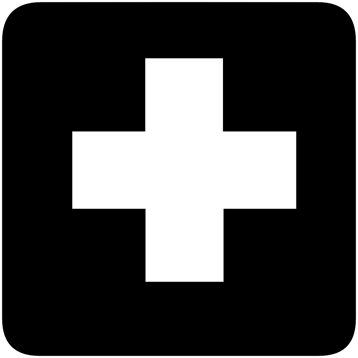
Vaccinations are important for everybody, but they are especially important for people with COPD and other chronic diseases. It is very dangerous to get sick when you have COPD because it can cause severe COPD exacerbations and other complications.
COPD actually depresses your immune system, making you more likely to get sick with infectious illnesses like the flu. It also makes your lungs more prone to infection and inflammation, so that even a minor illness can lead to life-threatening breathing problems in people with advanced COPD.
Now that you've been diagnosed with COPD, you can't take the risk of leaving your immune system unprotected. Avoiding illnesses and exacerbations is a key part of managing your disease, especially since exacerbations can cause irreversible lung damage and permanent lung function loss.
Because of this, getting vaccinated for the flu—and possibly pneumonia—is usually one of the first recommendations doctors give to someone recently diagnosed with COPD. In general, all adults aged 65 or older, or who have a chronic disease, should get the pneumonia vaccine; however, your doctor can tell you if you need it for sure.
The flu vaccine is particularly important, because influenza is a serious respiratory illness that kills up to 79,000 people every year and causes even more hospitalizations. In people with COPD, the flu can cause severe COPD exacerbations, and frequently leads to secondary lung infections like pneumonia.
While the pneumonia vaccine is a one-time thing, you will need to get a new flu vaccine every year to stay protected. Don't take this duty lightly; after all, it may only take one serious illness to make your COPD symptoms worse forever.
Even minor exacerbations can affect your ability to breathe and do daily activities for weeks, and it can take even longer to get back to baseline after a serious one. If you have severe COPD, exacerbations put you at risk for hospitalization, respiratory failure, and possibly even death.
Learn How to Manage Your New Medications
After your COPD diagnosis, your doctor will likely put you on a strict medication regimen. You are likely to receive, at the very least, a maintenance inhaler to use every day and a quick-relief inhaler to use as-needed when you find it difficult to breathe.
If your COPD is more severe, you will likely have a variety of additional medications to keep track of. This might be difficult to get used to at first, especially when some medications are regular, some are as-needed, and some you only use during a COPD exacerbation.
However, it's vital that you understand each medication as well as exactly how you're supposed to use it. If you haven't received one already, ask your doctor to give you a detailed COPD action plan, which will serve as a vital resource for you as you learn to manage your disease.
Your COPD action plan should detail each of your medications and the conditions for their use. It should explain when to take each medication, how much you're supposed to take, and if any other factors—such as bad symptom flare-ups—change how you should use it.
Once you fully understand your medications, it's important to set up a schedule and a routine to help you take them consistently and correctly. You can use whatever methods are available to keep yourself on track, such as sticky notes, phone reminders, or pill containers labeled with each day of the week.
Kickstart Healthy Daily Habits

When you're a healthy adult, it's all too easy to brush off the fact that you have a bad diet or have put on excess weight. However, these unhealthy habits become much too dangerous to ignore if you get diagnosed with COPD.
COPD patients who live an unhealthy lifestyle have worse symptoms and a much worse quality of life. This is especially true for people who have bad eating habits, don't get enough exercise, or have an unhealthy BMI.
Unfortunately, COPD symptoms like breathlessness, depression, and fatigue can make it difficult to stay healthy. However, it's important to work through these problems so that you can work out, stay active, and cook healthy, balanced meals.
It's okay if you need help; there are many diet, nutrition, and exercise specialists out there who can show you how to get on track. It's also good to start small, with simple steps and modest goals to help you move forward without feeling overwhelmed or burnt out.
Major lifestyle changes don't happen overnight, but it's important to get started as early as possible. The longer you wait to improve your habits, the worse your COPD symptoms will become, and the harder it will be to change.
However, making improvements in your diet and exercise can go a long way towards improving your COPD symptoms and your overall quality of life. It can even improve your ability to breathe and slow the rate of lung function decline over time.
If you're not sure whether or not your lifestyle needs to change, talk to your doctor about your current habits related to diet, exercise, and health. He can help you spot any unhealthy behaviors and give you pointers for how to improve.
To learn more, check out our following guides about COPD-healthy exercise and nutrition:
- Tips for Exercising at Home with COPD
- Learn which Foods You Should Eat and which Foods You Shouldn't Eat if you have COPD
- How to Reduce COPD-Related Fatigue
Ask Questions and Work With Your Doctor
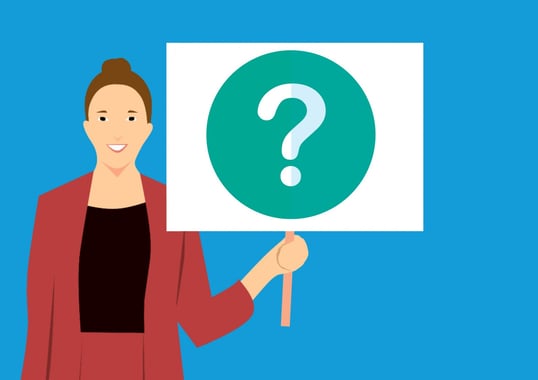
Living with COPD is no simple matter, and you're bound to have a lot of questions after getting diagnosed. When you do, don't be afraid to talk to your doctor and ask him to explain anything you don't understand.
Asking questions is a good thing; it shows you want to be involved in your treatment and learn how to manage your COPD. Your doctors are some of the best resources you have, so don't be afraid to ask for—or even insist on—answers to any questions that come up.
Working with your doctor should be an two-sided dialogue, and you should feel comfortable asking your doctor to provide you with explanations and clarifications. That's why it's important to work with a doctor you get along with and who you can trust to keep you informed.
If you're not quite sure how to open up a dialogue, take some time to think about any questions or concerns you have about your health and your disease. Write down everything that comes to mind, including any topics you and your doctor have already discussed that have you worried, confused, or unsure.
This exercise will expose gaps in your knowledge and help you figure out what you need to know. Then, the next time you talk to your doctor, bring this list of questions and concerns with you so you don't leave anything out.
If you need some ideas to get started, check out our guide with 16 questions you should ask your doctor about your COPD.
Get Support and Assistance from Family and Friends
Nobody should have to cope with a COPD diagnosis all on their own. As soon as you've processed the news and feel ready to discuss it, you should consider telling your family and friends about your disease.
The reasons for doing so are two-fold: First of all, the emotional support you get from the people who love you can be a huge relief and allow you to cope with your diagnosis in a healthier way. Second, it gives your family and friends the chance to offer physical and practical support, which you may need as you go through treatment.
For example, you could ask your loved ones to help you make the lifestyle changes needed to keep yourself healthy for as long as possible. You may also need to ask them for help with daily tasks, like cooking, cleaning, and making it to doctor's appointments in the more severe stages of COPD.
In many cases, friends and family members are more than happy to do what they can, even if it's just little things here and there. Having someone to help you go shopping, pick up your medications, or simply call to check up on you when you're not feeling well can make life just a little easier to manage when you're living with COPD.
Take the Time to Look After Your Mental Health
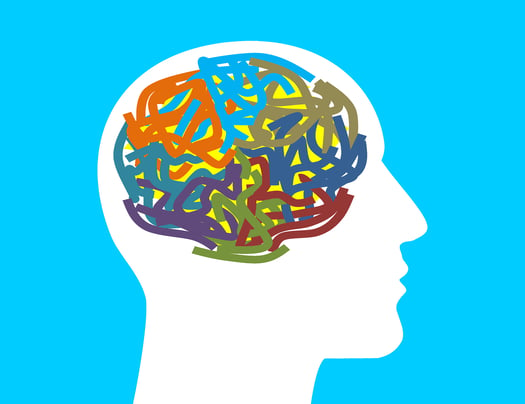
Getting diagnosed with COPD can be overwhelming and pile a whirlwind of responsibilities on your plate. However, once you deal with the immediate necessities, it's important to stop, take a breath, and do some self-care.
It's no secret that people with COPD are much more likely than others to suffer from mental health disorders like anxiety and depression. That's why it's vital to take your emotional and psychological health very seriously if you're living with COPD.
Having a chronic disease is stressful, and struggling to manage COPD symptoms every day can take a toll on your mental well-being. In order to keep yourself sane, you need to find healthy ways to cope with worry, fear, sadness, and stress in healthy ways.
Exercising and doing what you can to stay physically healthy helps, as do hobbies, social engagements, and activities that help you relax. It's important to continue to do the things you enjoy and care about, even if it becomes more difficult because of your COPD.
If you can't cope with negative emotional and psychological symptoms on your own, don't hesitate to ask for help. Don't be afraid to talk to people who love you about your struggles or see a mental health professional.
Conclusion

Now that you've learned the basics of living with COPD, it's up to you to take the next steps. You are the only one with the power to keep your body healthy and minimize your lung function decline.
The worst thing you can do after your COPD diagnosis is nothing; it's important to take an active role in your health and managing your disease. Your well-being depends on your ability to make healthy lifestyle choices and keep up with a complex treatment plan.
If you are proactive about treating your disease and adopting a lung-healthy lifestyle, you can minimize the effect that COPD has on your quality of life. The earlier you take action, the better chance you have to control your symptoms and slow down the progression of your disease.
If you follow the advice in this guide, you will be well on your way to learning how to knowledgeably and skillfully handle your COPD. However, this is only the first step in a long journey, and you should continue to learn everything you can about living with the disease.


.png)



